Volvo XC40 vs Hyundai Kona – Differences & prices compared
Compare performance, boot space, consumption and price in one view.
Find out now: which car is the better choice for you – Volvo XC40 or Hyundai Kona?
The Volvo XC40 (SUV) comes with a Petrol MHEV engine and Automatic transmission. In comparison, the Hyundai Kona (SUV) features a Petrol, Full Hybrid or Electric engine with Manuel or Automatic transmission.
When it comes to boot capacity, the Volvo XC40 offers 452 L, while the Hyundai Kona provides 466 L – depending on how much space you need. If you’re looking for more power, decide whether the 197 HP of the Volvo XC40 or the 218 HP of the Hyundai Kona suits your needs better.
In terms of consumption, the values are 6.50 L per 100 km for the Volvo XC40, and 14.60 kWh4.50 L for the Hyundai Kona.
Price-wise, the Volvo XC40 starts at 36400 £, while the Hyundai Kona is available from 23100 £. Compare all the details and find out which model fits your lifestyle best!
Volvo XC40
The Volvo XC40 is a standout model in the compact SUV segment, offering a delightful blend of Scandinavian design and practicality. Its interior is both stylish and functional, featuring premium materials and innovative storage solutions that make every journey comfortable. The car's performance is smooth and responsive, with advanced safety features ensuring peace of mind for drivers and passengers alike.
details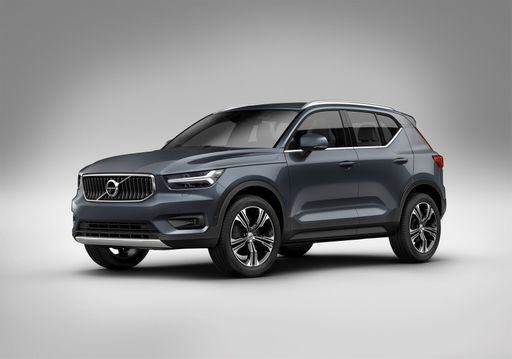 @ media.volvocars.com
@ media.volvocars.com
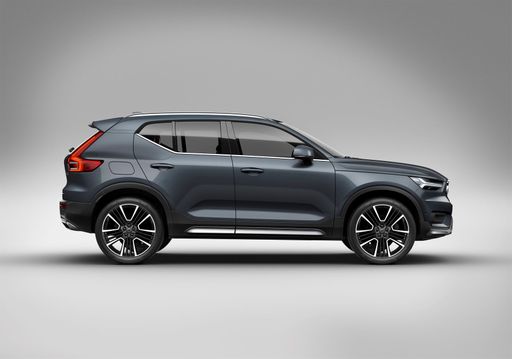 @ media.volvocars.com
@ media.volvocars.com
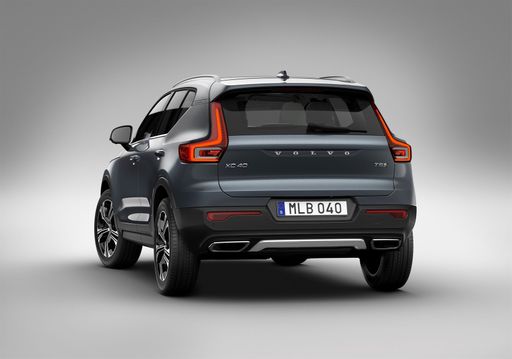 @ media.volvocars.com
@ media.volvocars.com
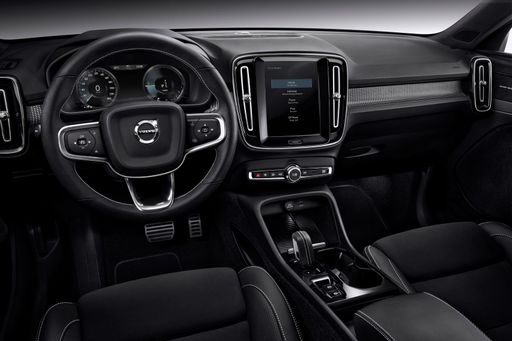 @ media.volvocars.com
@ media.volvocars.com
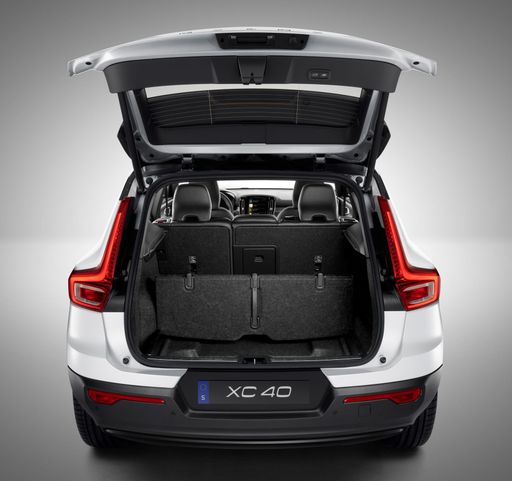 @ media.volvocars.com
@ media.volvocars.com
Hyundai Kona
The Hyundai Kona blends a bold design with a versatile interior, making it a standout choice in the compact SUV market. Its crisp handling and responsive steering provide an engaging driving experience, whether in the city or on the open road. The vehicle also offers a range of features designed to enhance comfort and connectivity, ensuring a pleasurable journey for both driver and passengers.
details @ hyundai.news
@ hyundai.news
 @ hyundai.news
@ hyundai.news
 @ hyundai.news
@ hyundai.news
 @ hyundai.news
@ hyundai.news

|

|
|
|
|
Costs and Consumption |
|
|---|---|
|
Price
36400 - 47200 £
|
Price
23100 - 41600 £
|
|
Consumption L/100km
6.50 L
|
Consumption L/100km
4.5 - 6.9 L
|
|
Consumption kWh/100km
-
|
Consumption kWh/100km
14.6 - 16.8 kWh
|
|
Electric Range
-
|
Electric Range
377 - 514 km
|
|
Battery Capacity
-
|
Battery Capacity
1.3 - 65.4 kWh
|
|
co2
147 - 148 g/km
|
co2
0 - 157 g/km
|
|
Fuel tank capacity
54 L
|
Fuel tank capacity
38 - 47 L
|
Dimensions and Body |
|
|---|---|
|
Body Type
SUV
|
Body Type
SUV
|
|
Seats
5
|
Seats
5
|
|
Doors
5
|
Doors
5
|
|
Curb weight
1688 kg
|
Curb weight
1370 - 1773 kg
|
|
Trunk capacity
452 L
|
Trunk capacity
466 L
|
|
Length
4425 mm
|
Length
4350 - 4385 mm
|
|
Width
1863 mm
|
Width
1825 mm
|
|
Height
1652 mm
|
Height
1580 - 1585 mm
|
|
Payload
532 kg
|
Payload
420 - 490 kg
|
Engine and Performance |
|
|---|---|
|
Engine Type
Petrol MHEV
|
Engine Type
Petrol, Full Hybrid, Electric
|
|
Transmission
Automatic
|
Transmission
Manuel, Automatic
|
|
Transmission Detail
Dual-Clutch Automatic
|
Transmission Detail
Manual Gearbox, Dual-Clutch Automatic
|
|
Drive Type
Front-Wheel Drive
|
Drive Type
Front-Wheel Drive, All-Wheel Drive
|
|
Power HP
163 - 197 HP
|
Power HP
100 - 218 HP
|
|
Acceleration 0-100km/h
7.6 - 8.6 s
|
Acceleration 0-100km/h
7.8 - 13.3 s
|
|
Max Speed
180 km/h
|
Max Speed
162 - 208 km/h
|
|
Torque
265 - 300 Nm
|
Torque
200 - 265 Nm
|
|
Number of Cylinders
4
|
Number of Cylinders
3 - 4
|
|
Power kW
120 - 145 kW
|
Power kW
74 - 160 kW
|
|
Engine capacity
1969 cm3
|
Engine capacity
998 - 1598 cm3
|
General |
|
|---|---|
|
Model Year
2024
|
Model Year
2024
|
|
CO2 Efficiency Class
E
|
CO2 Efficiency Class
D, C, E, F, A
|
|
Brand
Volvo
|
Brand
Hyundai
|
Volvo XC40
Introduction: The Refined Volvo XC40
The Volvo XC40 is a testament to Swedish innovation and design, blending practicality with cutting-edge technology in the compact SUV segment. Aimed at drivers who value safety, comfort, and eco-conscious driving, the XC40 continues to uphold Volvo's reputation for engineering excellence. In this article, we'll explore the technical specifications and innovative features that make the XC40 a standout choice for modern drivers.
Power and Performance
Under the bonnet, the Volvo XC40 offers a range of mild-hybrid petrol engines, combining efficiency with a responsive driving experience. The power output ranges from 163 to 197 PS (120 to 145 kW), ensuring robust performance for both urban commuting and longer journeys. With a maximum torque of 265 to 300 Nm, the vehicle offers smooth acceleration, achieving 0-100 km/h in just 7.6 to 8.6 seconds, whilst maintaining a CO2 efficiency class of E.
Efficiency Meets Eco-Conscious Design
The mild-hybrid system in the XC40 effectively reduces fuel consumption, with an impressive average of 6.5 L/100km. The system recycles braking energy to charge the battery, reducing emissions to between 147-148 g/km without compromising on performance. This design aligns perfectly with Volvo's commitment to sustainable motoring.
Cutting-Edge Transmission
The XC40 is equipped with an advanced automatic dual-clutch transmission that seamlessly transitions through gears, enhancing both fuel efficiency and driving comfort. The integration of this technology underscores Volvo’s commitment to delivering an engaging yet smooth driving experience.
Sophisticated Interior Design
The interior of the XC40 reflects Volvo’s dedication to Scandinavian design aesthetics, featuring a spacious cabin with high-quality materials. The vehicle comfortably seats five passengers, with a versatile boot space of 452 litres, making it ideal for family outings or road trips. The intuitive infotainment system is seamlessly integrated, providing driver-friendly access to navigation, entertainment, and safety features.
Safety Innovations
Volvo’s renowned safety reputation is evident in the XC40’s comprehensive suite of safety features. Advanced driver assistance systems, including adaptive cruise control, blind-spot monitoring, and lane-keeping aid, ensure a secure driving environment. The XC40’s construction and technology adhere to Volvo's “Vision 2020” strategy, aiming for zero fatalities or serious injuries in new Volvo cars.
Conclusion: A Contemporary Choice
The Volvo XC40 stands out as a compact SUV that blends innovation, efficiency, and style. Its proactive approach to hybrid technology, coupled with Volvo’s trademark focus on safety and design, makes it a compelling choice for those seeking a blend of practicality and performance. Whether it’s the daily commute or a weekend getaway, the XC40 is engineered to deliver a dynamic and sustainable driving experience.
Hyundai Kona
The Hyundai Kona: A Comprehensive Overview
The Hyundai Kona has established itself as a standout in the compact SUV segment, blending innovation with performance and style. As the automotive world moves towards more sustainable and efficient options, the Kona offers a variety of powertrains, from traditional petrol engines to full hybrids and all-electric models.
Powertrain Options and Performance
The Hyundai Kona's powertrain choices cater to a wide range of preferences. For petrol enthusiasts, the Kona offers a 1.0L T-GDI engine, delivering 100 PS, and a more robust 1.6L T-GDI variant with up to 170 PS. Those looking for efficiency without sacrificing power can consider the full hybrid model, offering 129 PS and an impressive consumption of 4.5 L/100km.
For a greener option, the all-electric Kona provides a compelling case. With battery capacities of up to 65.4 kWh, the electric Kona offers power outputs of 156 to 218 PS, and efficiencies as low as 14.6 kWh/100km, enabling an electric range of up to 513 km.
Technical Specifications and Innovations
Built on a robust platform, the Kona delivers versatility and reliability. With a choice between manual or dual-clutch automatic gearboxes, along with options for front-wheel or all-wheel drive, the Kona ensures a tailored driving experience. The handling is enhanced by the car's lightweight construction, balancing a 1370 to 1773 kg curb weight with dynamic performance.
The Kona's design doesn't compromise cargo space for style; it offers a generous 466 L boot capacity. With a relatively compact body, measuring 4350 to 4385 mm in length, the Kona easily navigates urban environments while still commanding a strong road presence with its 1825 mm width.
Efficiency and Eco-Friendliness
Hyundai is committed to reducing emissions, as evidenced by the Kona's CO2 efficiency ratings, which range from class A for electric models to class D for some higher-performance petrol variants. The focus on reducing environmental impact without sacrificing driving pleasure is notable throughout the Kona range.
Costing and Value
The Hyundai Kona offers commendable value for money. Pricing starts at €26,400 and reaches up to €50,690, depending on the chosen configuration. The monthly running costs range from €956 to €1090, with a cost per kilometre of 38.3 to 43.6 cents, making it a competitive option in its class.
Conclusion: Modern, Efficient, and Versatile
The Hyundai Kona stands as a testament to Hyundai's commitment to innovation, efficiency, and practicality. Whether you are inclined towards a traditional combustion engine, a hybrid for a balance of power and efficiency, or a full electric model for maximum eco-friendliness, the Kona provides a tailored solution for each unique driver preference.
The prices and data displayed are estimates based on German list prices and may vary by country. This information is not legally binding.
